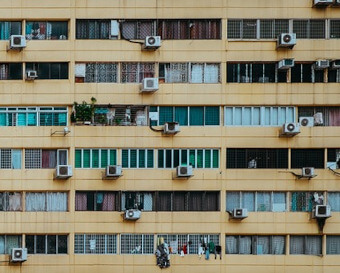Table of Contents
Air conditioners are no longer just a luxury for the wealthy citizens of the world — they are becoming a necessity. Staying cool and comfortable is just about impossible unless you own one of these devices.
While we welcome the benefits of air conditioning for basic, everyday living during the hot and muggy seasons, we also need to consider the hazardous environmental impact of air conditioning because of their use.
Air Conditioners Are Everywhere
Whether you are walking down the street in a crowded city or driving through a suburban neighborhood, heating and cooling systems are everywhere. They have become cheaper for companies to make, so households, even in developing countries, are using this source of comfort.
So many people have become accustomed to their presence that they cannot see themselves living without one. With the rising temperatures and extremely humid climates in many parts of the world, who can blame them? Still, everyone should know that they are contributing to environmental damage.
Environmental Impact of Air Conditioning

Air conditioners have an environmental impact in more ways than one, but the most significant are the inputs and the outputs. These popular cooling machines do not just function on their own; electricity powers them.
The effects of electricity production alone can be very detrimental to the world in which we live. The hazardous pollutants pumped into the air from traditional fossil fuels are one of the top sources of negative environmental impact.
Not only is the energy consumption detrimental, but the gases emitted from air conditioners are also affecting the environment.
Active 1: The Montreal Protocol has stamped out many, if not most, of the most harmful CFC gases, which reduces the emission of pollutants. However, the gases that are still being emitted have a huge impact on global warming. Some say that 27% of all global warming will be because of the gases emitted from air conditioning by the year 2050. This shocking statistic is due to the expected increase of use of air conditioning as temperatures continue to rise, thus creating a cycle of damage.
Moving Forward
So, what can we do to stop this damage from spiraling out of control? The Environmental Protection Agency (EPA) has developed plans stemming from the Montreal Protocol that would help to reduce the negative impact on the environment caused by the harmful gases emitted. As proposed, by next year, 2015, the United States must reduce its use of damaging HCFC’s to 90% below the baseline. This would drastically help to reduce the pollutants going into the environment, including those from air conditioners.
The EPA has also proposed alternatives for the materials used in air conditioning units. These substitutes will be less damaging to the ozone, thus helping to cut back on the cycle that is currently overwhelming the planet. Homeowners can also install options such as new cooling systems that rely on less damaging coolants.
Keep in mind that this shift to newer materials and systems will not only affect the environment, but it will also affect the jobs of those working in the heating and cooling service industry. While it is already required for technicians to keep their licenses up to date, they will also need to learn the latest information regarding the new cooling systems in order to help home owners reduce their environmental impact.
Resources such as online continued education courses for heating and cooling specialists will be extremely helpful, as they work to keep up with the latest information and policies. With new cooling systems being developed to combat environmental damage, these professionals will need to service, update and replace all systems so that they are within the current regulations.
Conclusion
The impact of air conditioning on the environment is obviously a very serious issue. We must address it now to avoid further damage. The rising and sometimes deadly temperatures make living without a cooling system very difficult and uncomfortable, and living without one is simply out of the question for many people in certain areas of the world. Regulations regarding the output of air conditioners must continue. Researchers must also develop substitutes for coolants until they are as environmentally friendly as possible.
Heating and cooling technicians will also need to stay up to date on the latest regulations, as well as continue their education as we develop new systems. Overall, innovation must continue before further damage from air conditioners causes an irreversibly drastic impact on the future of the planet.
Updated: 10/18/21



Great Article!!
But instead of ACs we can switch to Coolers that are environment friendly, less expensive and keeps cool the atmosphere. Here, in India we have been using this from so many years. However due to modernization now people are switching to ACs specially I large metro citiy. This is making our environment worse day by Day. Why don’t people start switching to these Coolers.
Nice article and great reminder to all of us that mother earth is injured by our actions and every little small act we take can help make her a greener and better world. Thanks for sharing your article
It is good to real realistic impacts of air conditioners upon atmosphere, after a weatherman friend advising temp change rates 25 years back. I had assumed it would be minor after nuclear development and motor vehicle/materials manufacturing by products.
I really thank that this website i really helpful thankyou.